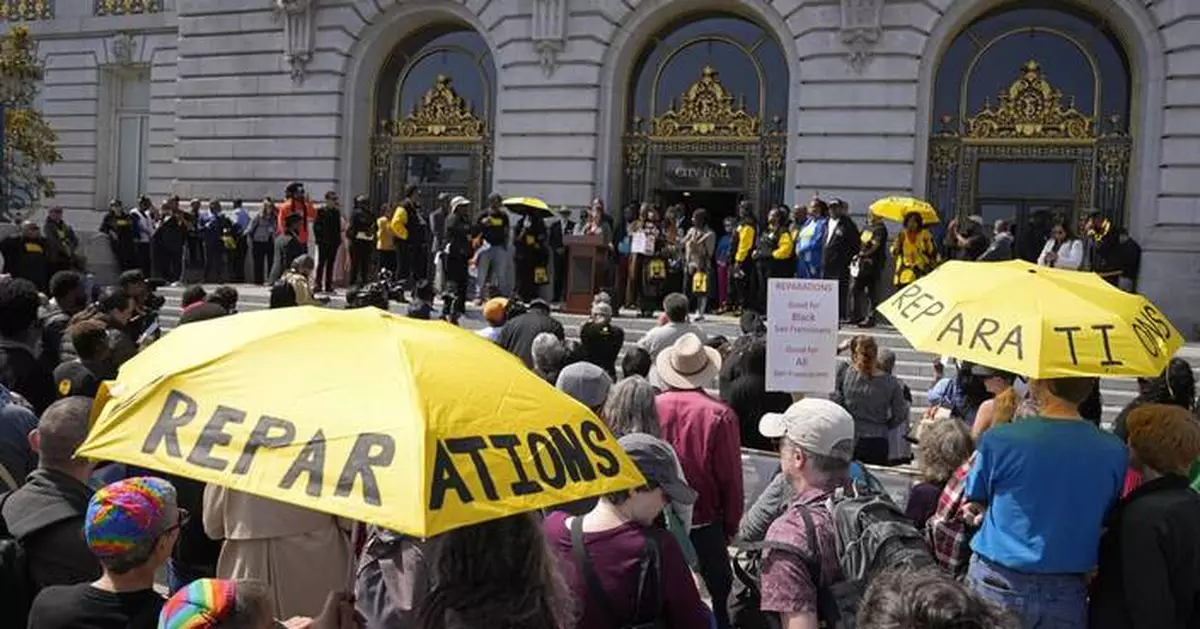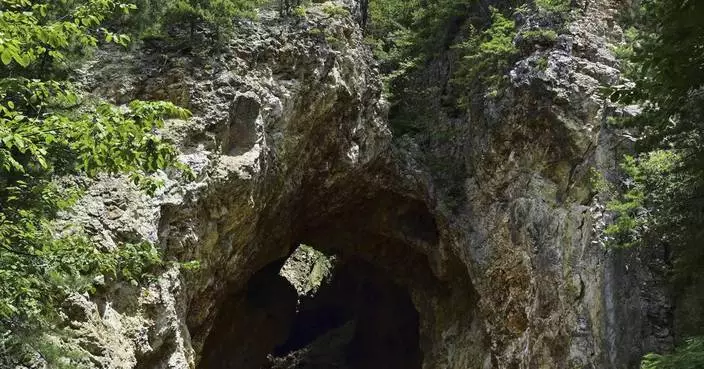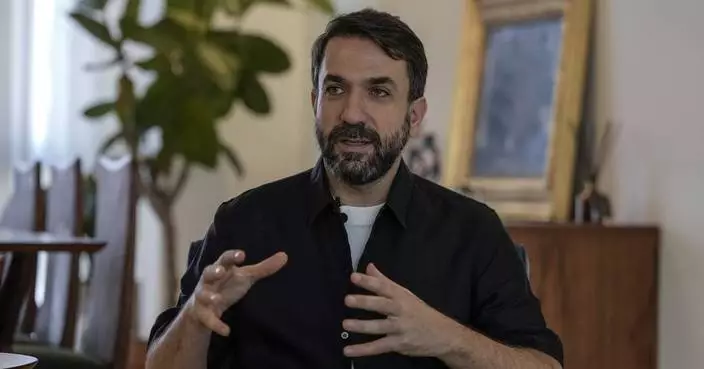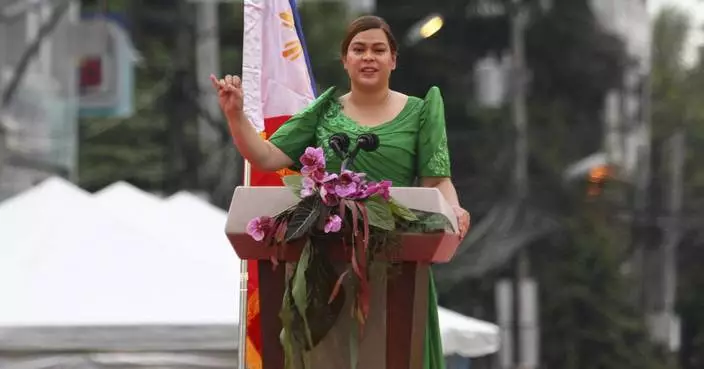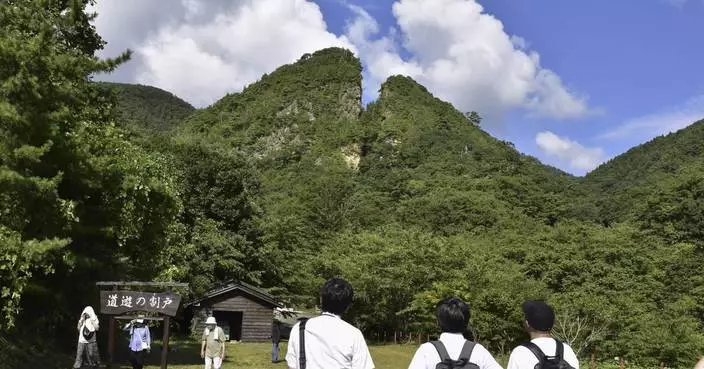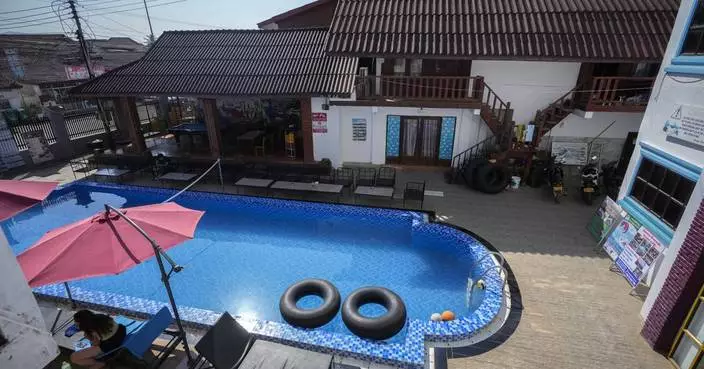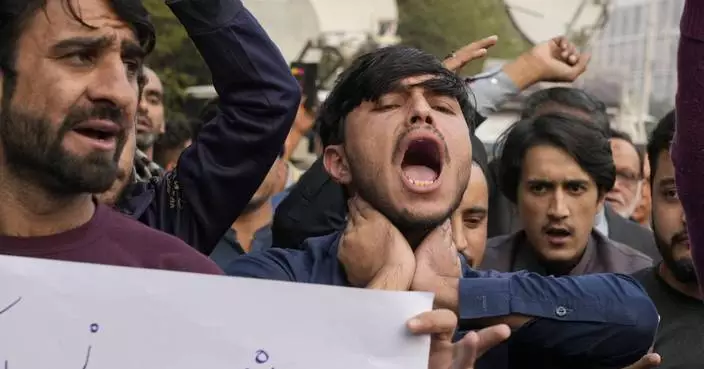SACRAMENTO, Calif. (AP) — California will formally apologize for slavery and its lingering effects on Black Americans in the state under a new law Gov. Gavin Newsom signed Thursday.
The legislation was part of a package of reparations bills introduced this year that seek to offer repair for decades of policies that drove racial disparities for African Americans. Newsom also approved laws to improve protections against hair discrimination for athletes and increase oversight over the banning of books in state prisons.
“The State of California accepts responsibility for the role we played in promoting, facilitating, and permitting the institution of slavery, as well as its enduring legacy of persistent racial disparities,” the Democratic governor said in a statement. “Building on decades of work, California is now taking another important step forward in recognizing the grave injustices of the past –- and making amends for the harms caused.”
Newsom signed the bills after vetoing a proposal Wednesday that would have helped Black families reclaim or be compensated for property that was unjustly seized by the government through eminent domain. The bill by itself would not have been able to take full effect because lawmakers blocked another bill to create a reparations agency that would have reviewed claims.
California entered the union as a free state in 1850. In practice, it sanctioned slavery and approved policies and practices that thwarted Black people from owning homes and starting businesses. Black families were terrorized, their communities aggressively policed and their neighborhoods polluted, according to a report published by a first-in-the-nation state reparations task force.
Efforts to study reparations at the federal level have stalled in Congress for decades. Illinois and New York state passed laws in recent years creating reparations commissions. Local officials in Boston and New York City have voted to create task forces studying reparations. Evanston, Illinois, launched a program to provide housing assistance to Black residents to help atone for past discrimination.
California has moved further along on the issue than any other state. But state lawmakers did not introduce legislation this year to give widespread direct payments to African Americans, which frustrated some reparations advocates.
Newsom approved a $297.9 billion budget in June that included up to $12 million for reparations legislation that became law.
He already signed laws included in the reparations package aimed at improving outcomes for students of color in K-12 career education programs. Another proposal the Black caucus backed this year that would ban forced labor as a punishment for crime in the state constitution will be on the ballot in November.
State Assemblymember Isaac Bryan, a Democrat representing Culver City, called legislation he authored to increase oversight over books banned in state prisons “a first step” to fix a “shadowy” process in which the Department of Corrections and Rehabilitation decides which books to ban.
The corrections department maintains a list of disapproved publications it bans after determining the content could pose a security threat, includes obscene material or otherwise violates department rules.
The new law authorizes the Office of the Inspector General, which oversees the state prison system, to review works on the list and evaluate the department's reasoning for banning them. It requires the agency to notify the office of any changes made to the list, and it makes the office post the list on its website.
“We need transparency in this process,” Bryan said. “We need to know what books are banned, and we need a mechanism for removing books off of that list.”
Sophie Austin is a corps member for The Associated Press/Report for America Statehouse News Initiative. Report for America is a nonprofit national service program that places journalists in local newsrooms to report on undercovered issues. Follow Austin on X: @sophieadanna
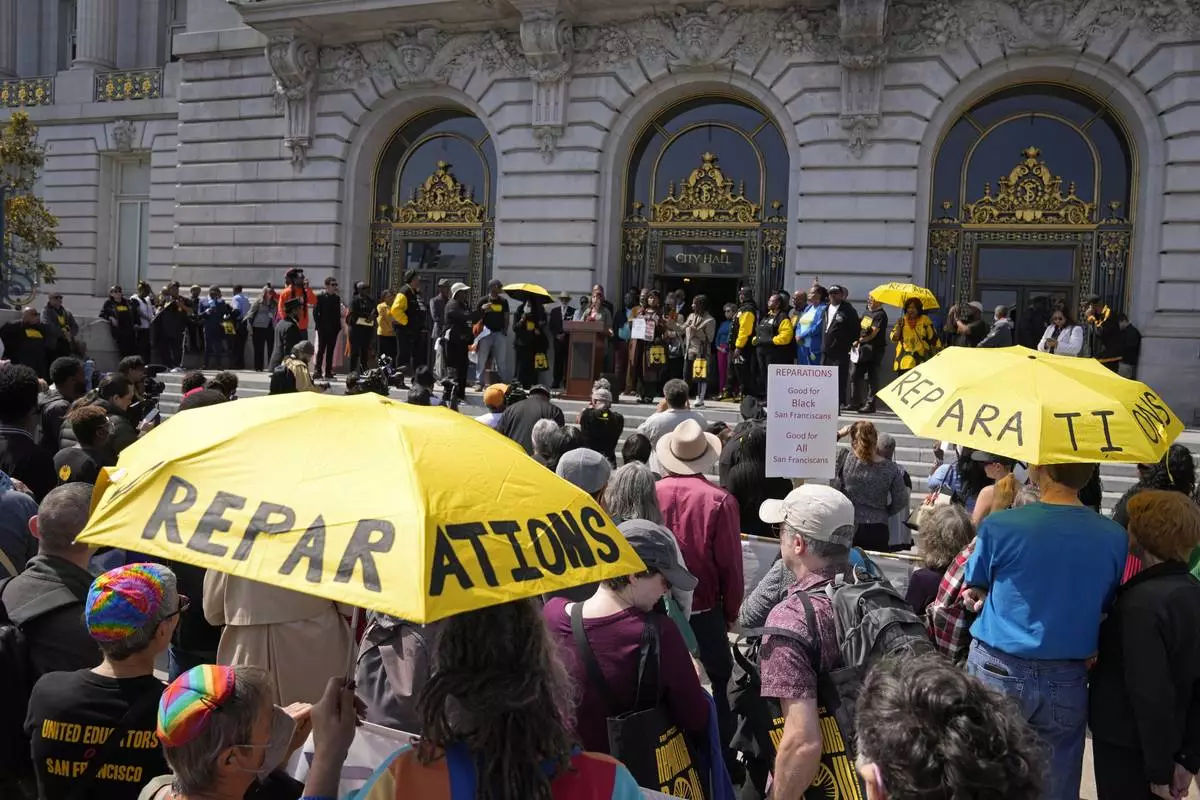
FILE - People listen during a rally in support of reparations for African Americans outside City Hall in San Francisco, Tuesday, Sept. 19, 2023. (AP Photo/Eric Risberg, File)
BAKU, Azerbaijan (AP) — The United Nations' annual climate talks pushed into overtime Saturday under a cloud of anger and disappointment as negotiators were well short of a deal on money for developing nations to curb and adapt to climate change.
A draft of the final agreement Friday pledged $250 billion annually by 2035, more than double the previous goal of $100 billion set 15 years ago but far short of the annual $1 trillion-plus that experts say is needed. Through the early hours of Saturday morning, The Associated Press saw lead negotiators from the European Union, the United States and other nations going through the empty halls from meeting to meeting as delegates tried to hash out a new version of the deal.
“We're still working hard,” U.S. climate envoy John Podesta told the AP past 4 a.m. local time. And by late Saturday morning, he and other delegations said talks on a new deal were still ongoing.
Alden Meyer, of the European think tank E3G, said negotiators now have very little room for error.
“They’ve got to make sure whatever they put on the table is something that can fly. ... Because otherwise we start to lose critical mass as ministers start to leave tonight and into tomorrow,” Meyer said. “So, they are under a deadline, but this is when it gets real.”
The climate talks, called COP29, in Baku, Azerbaijan, were scheduled to end Friday. Workers have already begun dismantling the venue for the talks.
Wealthy nations are obligated to help vulnerable countries under an agreement reached at these talks in Paris in 2015. Developing nations are seeking $1.3 trillion to help adapt to droughts, floods, rising seas and extreme heat, pay for losses and damages caused by extreme weather, and transition their energy systems away from planet-warming fossil fuels and toward clean energy.
Representatives of some of the nations that are obliged to contribute the cash said the $250 billion climate finance figure is realistic and reflects their limits at a time when their own economies are stretched.
But on Saturday morning, Irish environment minister Eamon Ryan said that he felt there'll be a new number in the next draft.
"We’ll have to see what the final number is. I don’t think it’ll be the one initially published yesterday," Ryan said. “But it’s not just that number — it's how do you get to 1.3 trillion."
Ryan said that any number reached at the COP will have to be supplemented with other sources of finance, for example through a market for carbon emissions where polluters would pay to offset what they emit.
The amount in any deal reached at COP negotiations — often considered a “core” — will then be mobilized or leveraged for greater climate spending. But much of that means loans for countries drowning in debt.
“We have to get agreement quickly. And I hope and believe we can,” Ryan said.
Vulnerable nations, many already battered by extreme weather made worse largely by emissions from the burning of fossil fuels they've had little to do with were angered by the draft text published on Friday.
“Developed countries must commit trillions, not empty promises," said Harjeet Singh, Director for the Fossil Fuel Non-Proliferation Treaty Initiative. "Anything less makes them squarely responsible for the failure of these talks and the betrayal of billions across the globe.”
Meyer of E3G said it’s still up in the air whether a deal will come out of Baku at all.
“It is still not out of the question that there could be an inability to close the gap on the finance issue,” he said. “That obviously is not an ideal scenario.”
Several dozen activists marched in silence outside the halls where delegates meet late Friday, raising and crossing their arms in front of themselves to indicate rejection of the draft text.
Also late Friday, 355 civil society organizations released a letter in support of the G77 and China negotiating group’s rejection of the latest draft.
The letter urged negotiators to “stand up for the people of the Global South," saying that “no deal in Baku is better than a bad deal.”
Lidy Nacpil, a Filipino coordinator with the Asian Peoples’ Movement on Debt and Development, said activists would still be unhappy if the climate finance number doubles to $500 billion.
“We’re still at this point where we are asking developing countries to stay strong and not just give in to far, far less than what should be,” she said.
With bleary eyes, seated around cold pizza, a group of youth activists chatted to keep each other awake through the early hours of Saturday in one of the main halls of the venue.
“All of us are kind of in mourning in a way,” said Jessica Dunne, with the Alliance of Non-Governmental Radical Youth. But the group said being in community eases the painful emotions that come with a process Dunne called an “abject failure.”
“In these halls tonight, as we’re sitting here and we’re talking and we’re dancing and crying and laughing, it kind of gives you hope that there will be another day that we’re going to fight for,” she said.
Associated Press journalists Ahmed Hatem, Aleksandar Furtula and Joshua A. Bickel contributed to this report.
The Associated Press’ climate and environmental coverage receives financial support from multiple private foundations. AP is solely responsible for all content. Find AP’s standards for working with philanthropies, a list of supporters and funded coverage areas at AP.org.
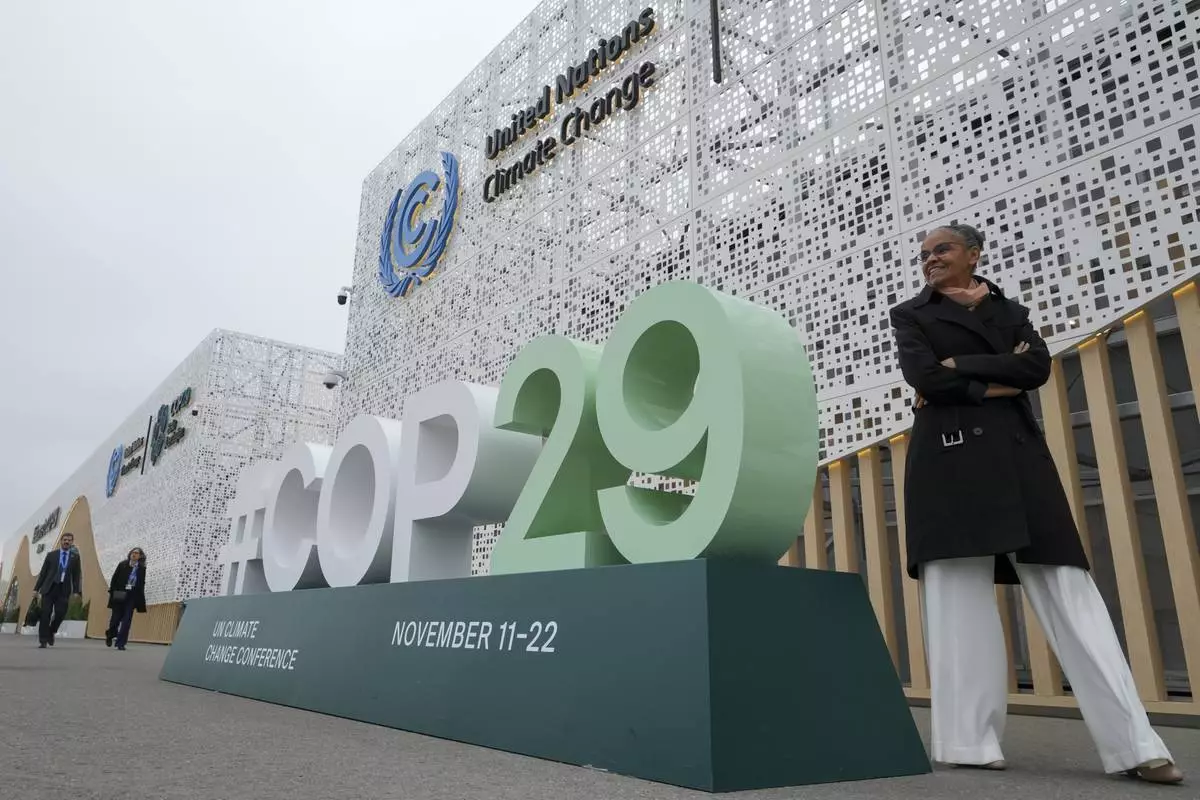
Marina Silva, Brazil environment minister, stands near a sign for the COP29 U.N. Climate Summit, Saturday, Nov. 23, 2024, in Baku, Azerbaijan. (AP Photo/Sergei Grits)
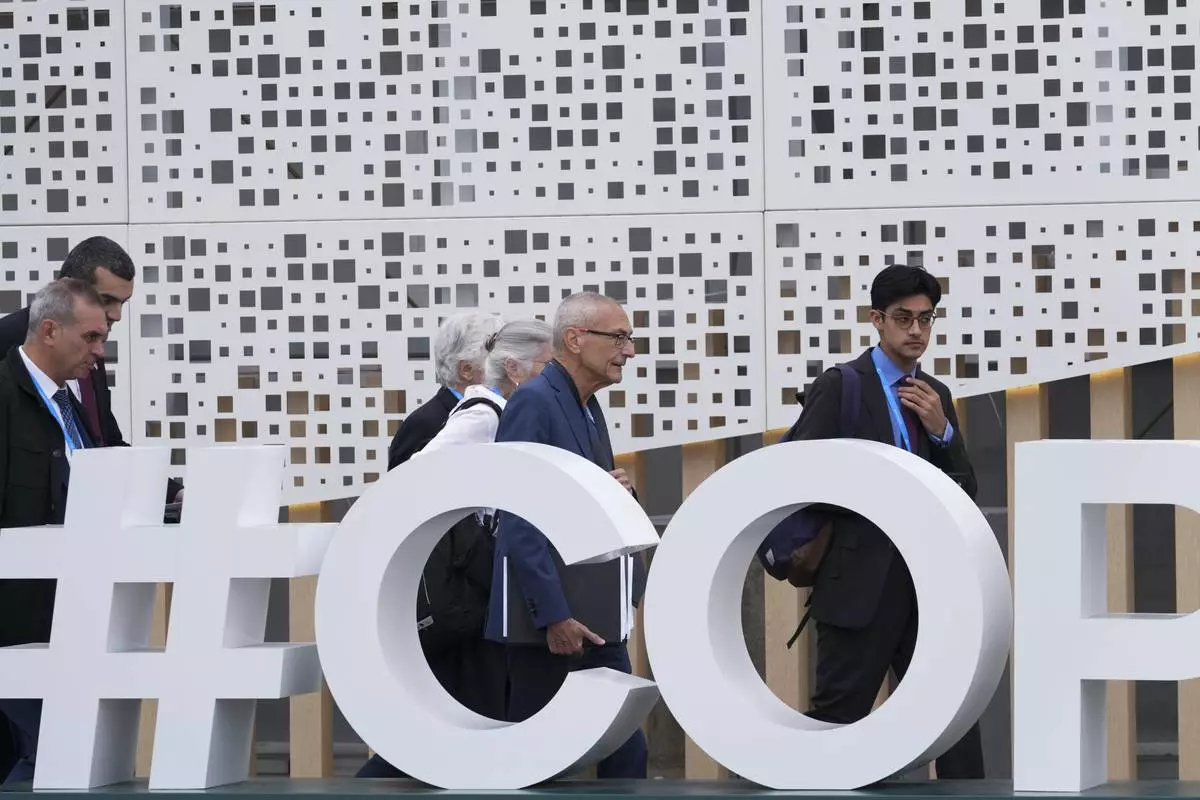
John Podesta, U.S. climate envoy, center right, and U.S. Deputy Climate Envoy Sue Biniaz, center, walk outside the venue for the COP29 U.N. Climate Summit, Saturday, Nov. 23, 2024, in Baku, Azerbaijan. (AP Photo/Sergei Grits)
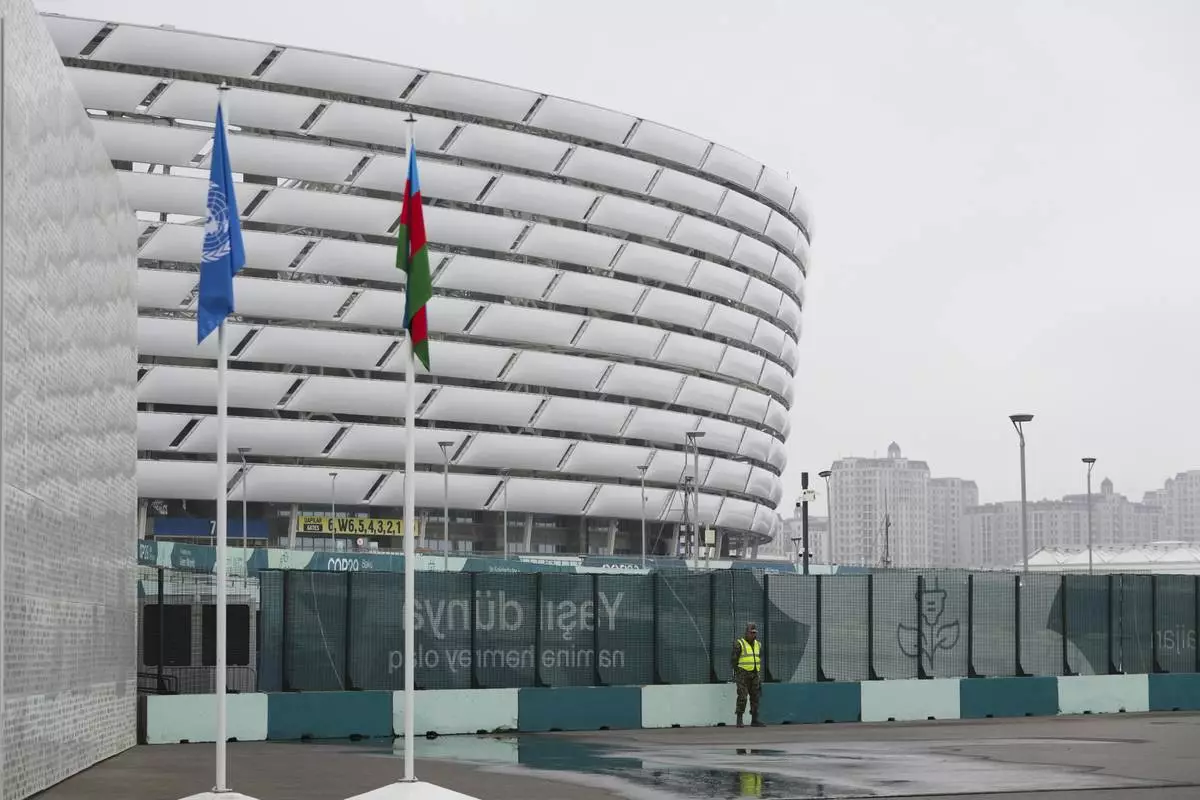
A member of security stands with the Baku Olympic Stadium in the background during the COP29 U.N. Climate Summit, Saturday, Nov. 23, 2024, in Baku, Azerbaijan. (AP Photo/Sergei Grits)
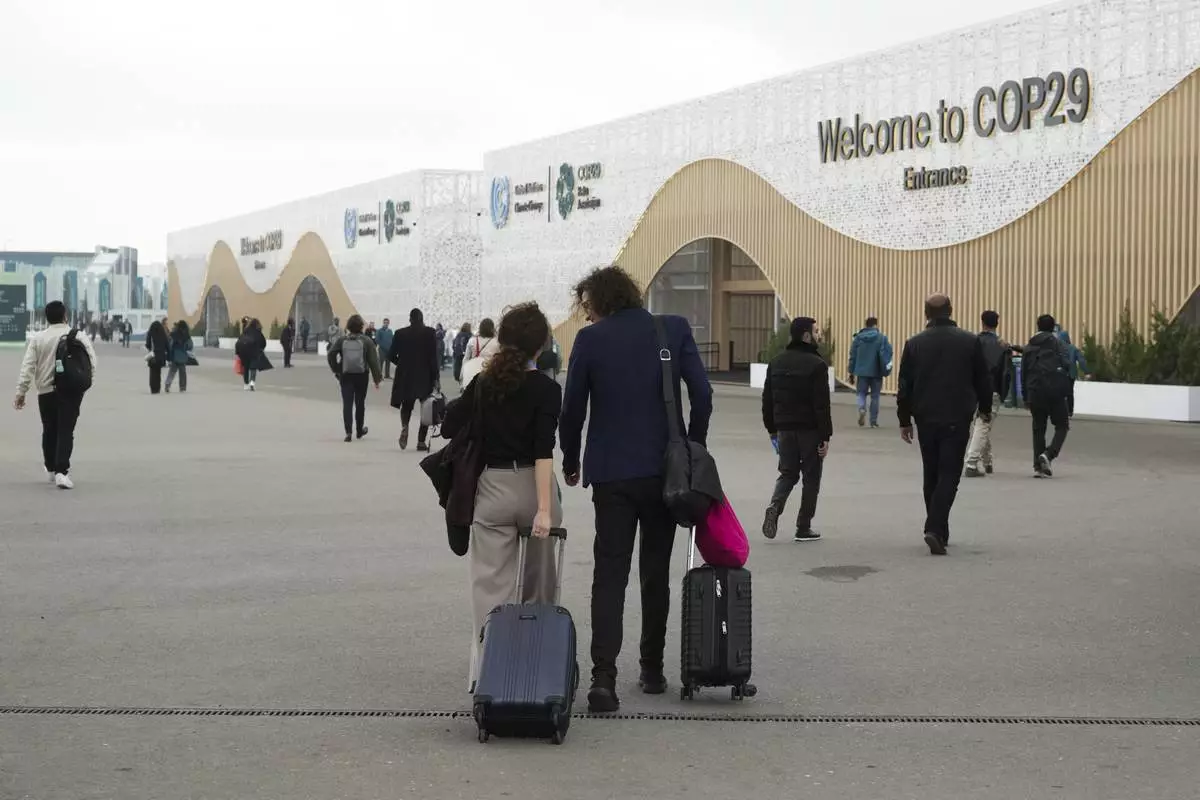
Attendees pull luggage as they walk into the venue for the COP29 U.N. Climate Summit, Saturday, Nov. 23, 2024, in Baku, Azerbaijan. (AP Photo/Sergei Grits)
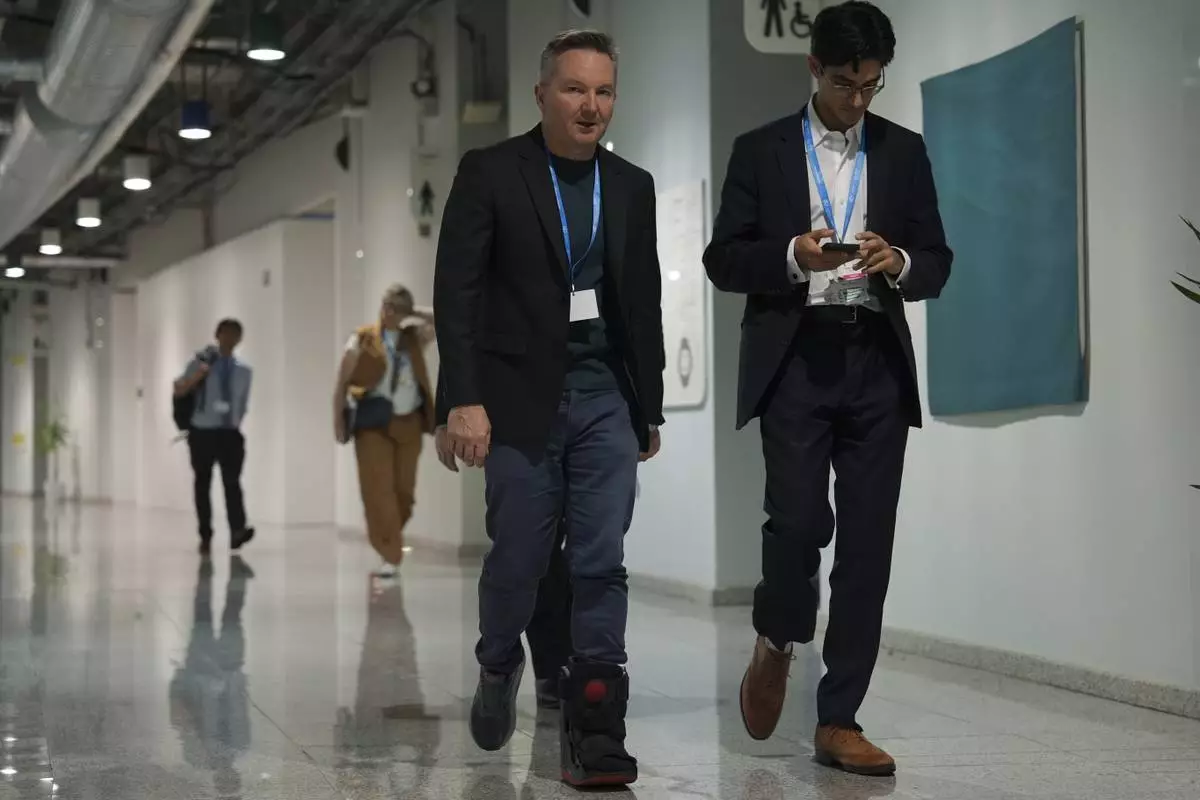
Australia Climate Minister Chris Bowen, center, walks through a hallway at the COP29 U.N. Climate Summit in the early hours of Saturday, Nov. 23, 2024, in Baku, Azerbaijan. (AP Photo/Joshua A. Bickel)
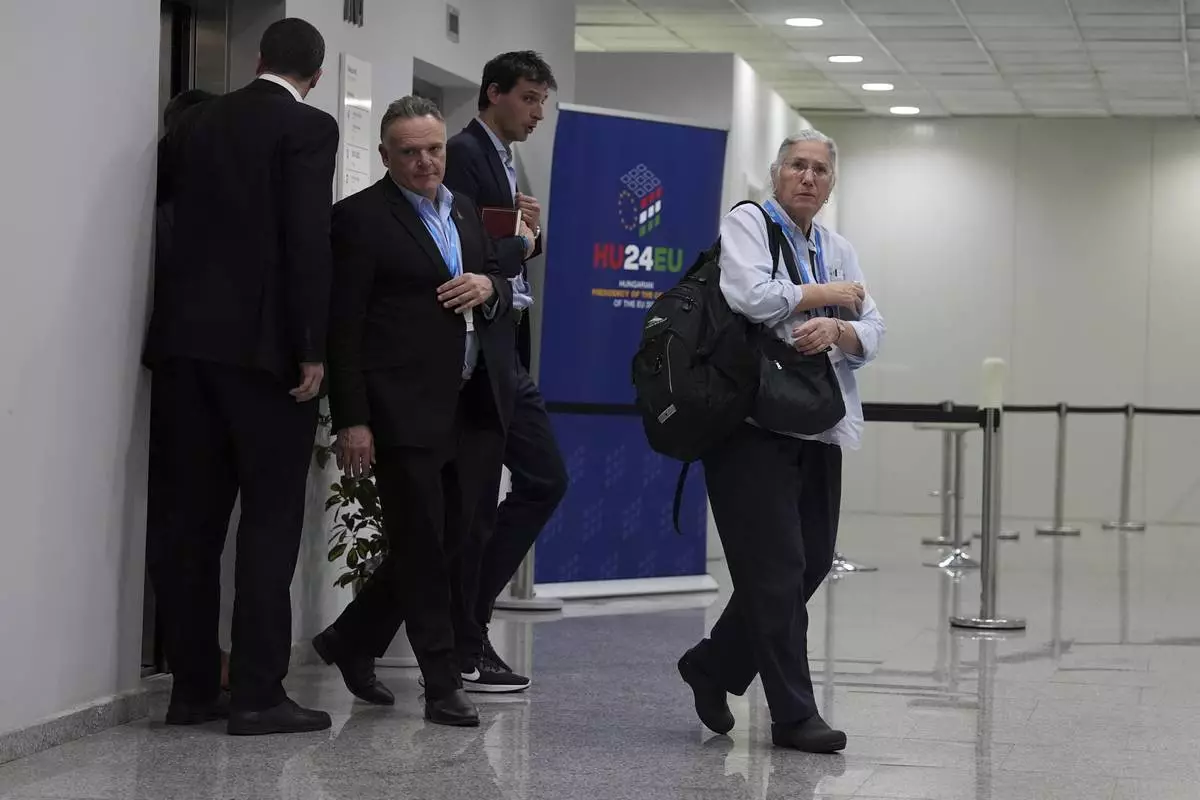
U.S. Deputy Climate Envoy Sue Biniaz, right, and Wopke Hoekstra, EU climate commissioner, second from right, walk out of an elevator during the COP29 U.N. Climate Summit in the early hours of Saturday, Nov. 23, 2024, in Baku, Azerbaijan. (AP Photo/Joshua A. Bickel)

John Podesta, U.S. climate envoy, right, walks through the hallways of the COP29 U.N. Climate Summit in the early hours of Saturday, Nov. 23, 2024, in Baku, Azerbaijan. (AP Photo/Joshua A. Bickel)
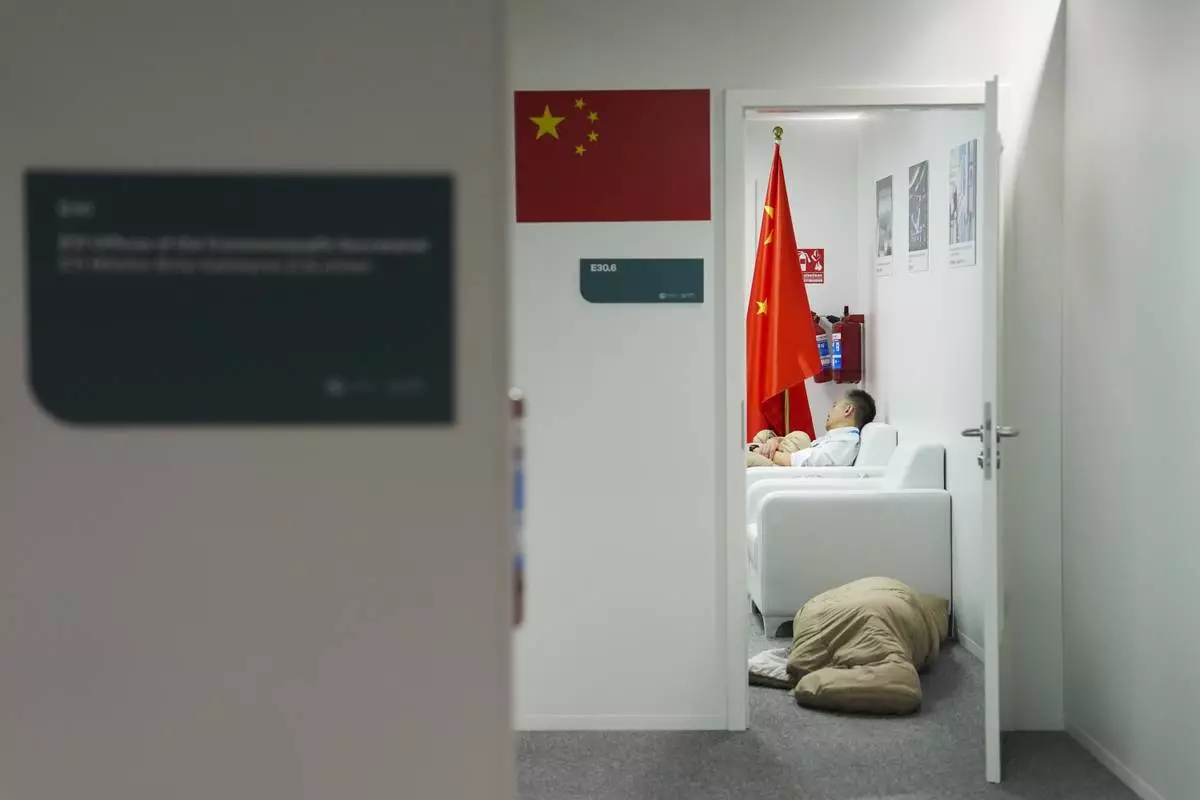
People sleep in the Chinese delegation offices at the COP29 U.N. Climate Summit in the early hours of Saturday, Nov. 23, 2024, in Baku, Azerbaijan. (AP Photo/Joshua A. Bickel)
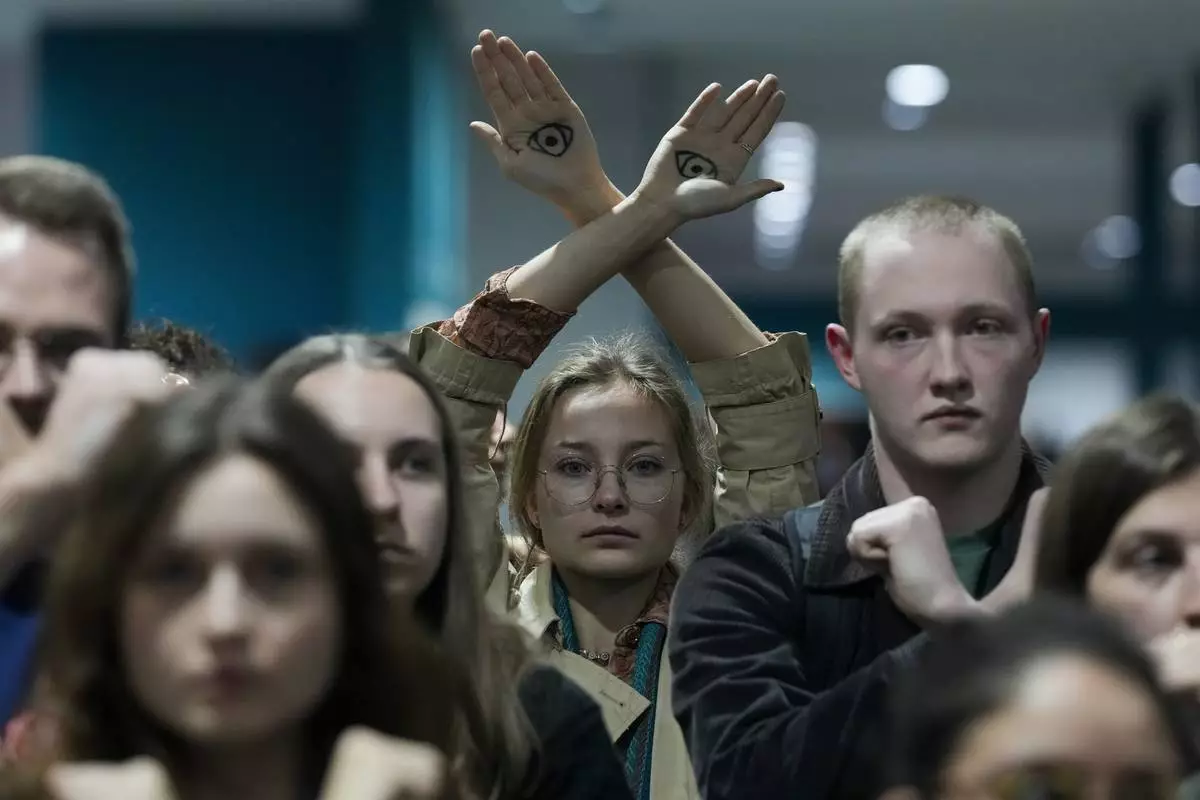
Activists demonstrate in silence protesting a draft of a proposed deal for curbing climate change at the COP29 U.N. Climate Summit, Friday, Nov. 22, 2024, in Baku, Azerbaijan. (AP Photo/Rafiq Maqbool)



